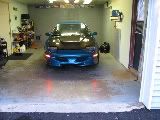Ok, so there's been 954,545,235,765,345 posts about "How much would it cost to do this or that to my car at a shop" or "How much should I expect to pay?". Mostly, the same answers are given over and over again, from "Go get some estimates" to "do the work yourself and save money".
I for one, and am not alone on this, am growing tired of the same questions, with the same answers, and the answers cannot really be given over the internet, because there are so many determining factors as to what the cost will be.
Here's some basic guidelines and such:
1. Go to shops in your area and get estimates. No one on here can tell you what you can expect to pay really, and have it be a good estimate. If one gives an approximate cost on what they paid to get their work done, and the person making the post goes to a shop and gets ticked off because they were given a much higher estimate, it causes problems. There are many determining factors as to what cost you would expect to pay at a shop, being:
2. Different shops charge different rates. If you want a show quality paint job, expect to pay much more than someone who just wants âgood" work. YOU DO get what you pay for. If you want to be cheap, you're going to get cheap work, and then complain about it later. So, if you want good reliable work, save up your money, and get an excellent quality paint job with a warranty. (Most reputable shops will warranty their work, except in cases of normal wear and tear,⦠if they won't stand behind their work, walk out, and go to another shop.
3. Rates vary by location. I'd imagine you'd get charged more for the work you want done in a place like New York City, LA, etc. than you would a small shop in a rural area.
4. The price varies on what you want done and the materials you're working with. If you go get a cheap fiberglass kit that doesn't fit for crap, you're going to pay more at the shop to make it fit better and look good. If you spend the extra money on a high quality kit/urethane kit, you're PROBABLY going to pay less, because there's less work needed to be done to get it to fit properly. If you want fancy paint (i.e. HOK, X-otic, chamelion and candee/kandy colors), that's going to cost more too.
5. The price could go up if the shop runs into unexpected problems. Any auto body/paint person will tell you that they've seen a car come in that didn't LOOK bad, but once they started tearing things apart, noticed many problems. An example would be this newer Grand Prix that came into one of the shops I was working at. It was whacked HARD in the passenger side fender. Upon initial inspection, it appeared it obviously needed a new fender, alignment, strut/shock, spring, (you know what whole assembly in there), rim and tire. However, we later noticed that it was hit so hard, it broke BOTH of the motor mounts, and cracked the transmission.
6. Ask a shop to see examples of their work. If you want a show quality paint job, or a very very good paint job, they should have examples of the work they've done. If you're concerned about it, and they can't produce any pictures/examples, go to a different shop.
7. ORANGE PEEL IN CLEAR IS NORMAL!!!! ANY new car you go look at WILL HAVE ORANGE PEEL!!! Orange peel does not mean it's a poor quality job. If you want no orange peel and want your clear to look like glass, you're going to have to pay extra. That requires extra clear, and a TON of wetsanding and buffing. (btw, orange peel is the texture of the clear, which resembles the texture of an orange, in case anyone doesn't know).
8. MORE COATS OF PAINT DOES NOT MEAN IT'S A BETTER PAINT JOB!!! I see people all the time going "oh yeah, well my car has 12 coats of paint and 18 coats of clear, etc, etc etc." In the older days of paint, from my understanding, lots of paint was a good thing. The paint used nowadays (the old style paint is now illegal to use for environmental reasons), anyway in the paint used nowadays, the more coats of paint, the WORSE it is! Think of a sheet of plastic. A very thin sheet of plastic will flex and bend a good bit before cracking and breaking. A thicker sheet of plastic, will be MUCH harder to flex, and when it finally does, it will crack and/or break, that's how your paint is. Paint thickness when applied is measured in what's called microns. The thicker the paint (i.e. the more microns) the higher probability of cracking and breaking and spidering. So the thicker the paint, the higher the probability of it going to crap in a shorter period of time.
9. If you have NO auto body/paint knowledge or training, (not to be rude) but DO NOT come on here and ask us very few auto body professionals to give you a step by step tutorial on the entire process. To do even just "good" work, you do need hands on and quite a bit time wise in training. We cannot teach you to be an auto body professional over the internet, it's just not possible. You have to be trained in what to look for, how to tell if your work is good, or what it still needs, what do you do if you get fisheyes? (those little spots that can appear in paint that look like fish's eyes), what about runs? What about dry spots? What if your paint is "lifting" (i.e. not sticking to the surface you're painting)? What's the proper way to prep? What grits of sand paper do you use for different applications? What's the proper way to sand? What's the right way to apply flake/metallics/pearls? What's the proper way to apply your clear? Clear, depending on the brand and type, needs to be applied in different ways. Some clears you have to lay on heavier, some not. How do you know if you're laying your clear on too light or too heavy? What do you do if you're clear is on too light or too heavy? How do you apply paints with metallics? Paints with metallics and pearls are applied slightly differently than paints without pearls or metallics. What if you run your basecoat? How long do you wait to wetsand and buff? What are the determining factors in what activators and such do you use? What do you need place wise to paint in and what can you get away with under different circumstances?? Under different circumstances and situations, what extra steps may be needed to prep the car for paint properly?
10. Auto body work and paint is NOT as easy and simple as you think. As you can see from just SOME of the questions I have listed in #9, a lot more goes into it than just slapping on some filler and sanding, or slapping on some primer and sanding, and painting, and throwing some paint in a gun and spraying.
11. I've seen people say they have some experience, but don't know where to get paint. A person with experience should know where to get paint, but if for some reason you're wanting to wing it, the best places to go is an auto body supply store. Where can you find one? The yellow pages and the internet, are your friend.
12. Changing the color of your car is going to be a good bit more expensive than keeping it the same color. When you change the color of your car, you need to paint the doorjams, under the hood, under the trunk, etc. and if you want a really want a good color change, pull the motor, interior, etc. So, depending on how far you want to go, and how high of quality you're looking for, your location, and the shop, the prices could vary greatly there too.
13. Custom work. Again, depending on where, what shop, how involved it is, how much time is involved, what you want done, etc. prices vary greatly, and none of us who have done this professionally can tell you what you'd be looking to pay.
Now, none of what I posted was meant to come off in a negative way. It's to be used as information as to just how many different factors go into the price of your body work and paint, and how many different things you need to be trained in what to look for when it comes to "doing it yourself". Call it a guide if you will (and PLEASE make this a sticky!)
I've seen "show quality" jobs (mind you with little to no body work involved, i.e. not 1,000 dents to be pulled, a very nice fitting kit, etc) range from, believe it or not 2k to over 8k. That's a huge difference in price.
So, your best bet for the most accurate of estimates, is to get up off your butt, and go to some shops in your area and ask around. Tell them what you're looking for, what you want done, if they warranty their work, ask to see examples, etc.
If you're cheap, and don't want to pay for good work, then expect cheap work. If you want excellent quality, save up your money and get it done right. Cutting corners and getting cheap work is only going to cost you more in the long run. If you find modding your car to be too expensive, I'd suggest finding a new hobby, or buy some beat up piece of junk and get some books on body work and paint, and start practicing on your own. OR, get an apprenticeship at a shop, or go to school for it.
I have no problem myself with someone who has been trying to learn themselves with an extra pointer or tip here and there, but it does irritate me when people think that body work and paint is just soooooo easy that a monkey can do it, and think that we professionals can just type some words on a screen and have you turn out an excellent job. Again, none of this is to be rude or anything near that, just informative information that I hope some people will find to be helpful.



















